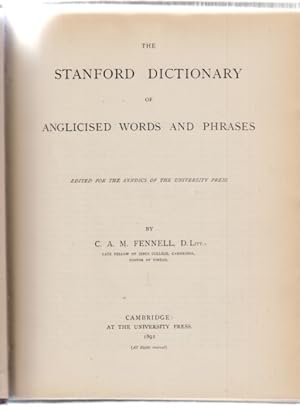Beschreibung
XV; 826 Seiten; 29 cm; fadengeh., goldgepr. Orig.-Halblederband. Ein gutes, stabiles Exemplar; mit Kopfgoldschnitt; Einband stw. berieben / beschabt; Seiten minimal nachgedunkelt; Vorsatz mit kl. Besitzerstempel. - Erstausgabe / STANDARDWERK. - EA. - THE main objects of this work are -- first, to enable the 'English reader' to find out the meaning and history of the foreign words and phrases which occur so frequently in English literature; secondly, to register the increase of the English vocabulary directly due to the adoption and naturalisation of foreign words since the introduction of printing; thirdly, to record all English words of foreign origin which have retained or reverted to their native form. The smallness of the staff and the small number of contributors have made it inevitable that these objects should not be fully attained and that the work should be uneven, but it is hoped that the attempts may be found to have met with a satisfactory measure of success. More than 50 per cent. (i.e. more than 6400) of the articles of the Dictionary and Supplement are devoted to the first object, which is popular; while the general public cannot fail to find very many of the remaining articles both useful and interesting even if the second and third objects above mentioned be not widely appreciated. The term " Anglicised" has been taken to mean {a) ' borrowed and wholly or partly naturalised', as amity, bagatelle, calibre, calico, elegant, flummery, potato; (b) 'used in English literature without naturalisation' (often, however, with more or less mispronunciation), as amour (Mod.), cafe, embonpoint, enfant terrible, flotilla, genius, non compos mentis, onus probandi; (c) ' familiarised by frequent quotation', such as revenous a nos moutons, littera scripta manet, omne ignotum pro magnifico est, ora pro nobis, which are not Anglicised at all in the strict application of the term, but which it is convenient to include with such phrases as d tort et a travers, amende honorable, enfant terrible, non compos mentis, onus probandi. Several hundred carefully selected books have been read for the purpose of collecting the literary materials upon which the best part of the work is based. When the University of Cambridge, in 1882, accepted the bequest of £ 5000 left by the late Mr J. F. Stanford to be employed in the production of a dictionary of " Anglicised Words and Phrases", the notes and collections made by Mr Stanford himself with a view to such a work were carefully examined. Mr Stanford's interpretation of the term Anglicised" was found to be very free, in fact equivalent to that given above. … It would have been an endless and useless task to record all the words by which modern travellers and novelists have sought to give ' local coloring' to their narratives, such as numerous native words meaning ' milk', ' meat', ' rice', ' grass ', ' horse', ' father', ' priest', &c, which have not been and are never likely to be Anglicised or to become familiar in English speech or literature. It has been thought well to omit geographical names applied only or mainly in trade to exports or in finance to stocks and shares; such as Demerara (sugar). Many of the words which have been treated have severally developed in English a group of derivatives. No notice has been taken of such derivatives; e.g. echo and naive have been treated, but not echo, vb., echoic, echo/ess, echoy, naively, naivety. A great many technical terms, which are employed in the fine arts, architecture, the drama, history, music, and rhetoric, appear with comparative frequency in general literature. Such terms therefore have been more freely admitted than terms relating to other arts and sciences. The Syndics of the University Press, who settled the form and method of the Stanford Dictionary, decided to confine the etymology in the main to the indication of the language from which a word or phrase has been borrowed and of its native form and meaning, unless there was some f.
Bestandsnummer des Verkäufers 1199463
Verkäufer kontaktieren
Diesen Artikel melden

